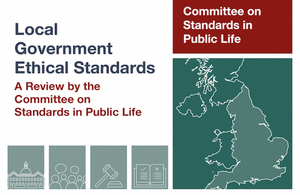Local government ethical standards: Committee publishes report
The Committee on Standards in Public Life has today published its report on local government ethical standards.

Local government ethical standards report
New report – local government standards system needs more robust safeguards
The Committee on Standards in Public Life today published its report and recommendations on ethical standards in local government, following a year-long review and wide consultation. Key recommendations include:
- a new power for local authorities to suspend councillors without allowances for up to six months
- revised rules on declaring interests, gifts and hospitality
- local authorities retain ownership of their own Codes of Conduct
- a right of appeal for suspended councillors to the Local Government Ombudsman
- a strengthened role for the Independent Person
- greater transparency about the number and nature of Code complaints.
Launching the report, Lord Evans, Chair of the Committee on Standards in Public Life, said:
“Local government impacts the lives of citizens every day, providing front-line services to those it serves. Its decisions directly affect the quality of life of local people. High standards of conduct in local government are needed to demonstrate that those decisions are taken in the public interest and to maintain the public’s confidence.
“The evidence we received supports the view that the vast majority of councillors and officers maintain high standards of conduct. There is, however, clear evidence of misconduct by some councillors. Most of these cases relate to bullying or harassment, or other disruptive behaviour. There is also evidence of persistent or repeated misconduct by a minority of councillors. “We are also concerned about a risk to standards under the current arrangements, as a result of the current rules around declaring interests, gifts and hospitality, and the increased complexity of local government decision-making.”
“We believe that the benefits of devolved arrangements should be retained, but that more robust safeguards are needed to strengthen a locally determined system. We are also clear that all local authorities need to develop and maintain an organisational culture which is supportive of high ethical standards. A system which is solely punitive is not desirable or effective; but, in an environment with limited external regulation, councils need the appropriate mechanisms in place to address problems when they arise.
“Our recommendations would enable councillors to be held to account effectively and would enhance the fairness and transparency of the standards process. Introducing a power of suspension and a model code of conduct will enable councillors to be held to account for the most serious or repeated breaches and support officers to address such behaviour, including in parish councils. Strengthening the role of the Independent Person and introducing a right of appeal for suspended councillors will enhance the impartiality and fairness of the process, which is vital to ensure that councillors are protected from malicious or unfounded complaints. And greater transparency on how complaints are assessed and decided in a system which is currently too reliant on internal political party discipline will provide a safeguard against opaque decision-making and provide reassurance to the public.
“Finally, I would like to thank all those who responded to our consultation or gave us their time and contributions to help build the evidence base for this report. It is clear to us that local government in England has the willingness and capacity to uphold the highest standards of conduct; our recommendations and best practice will enable them to do so.”
Download report here.
Download evidence here.
Notes to Editors
- Interview requests and media enquiries should go to Maggie O’Boyle on 07880 740627.
- The independent Committee on Standards in Public Life advises the Prime Minister on ethical standards across the whole of public life in the UK. It monitors and reports on issues relating to the standards of conduct of all public office holders. To find out more about the Committee’s work click here.
- The current members of the Committee are: Lord (Jonathan) Evans, Chairman, Rt Hon Dame Margaret Beckett DBE MP (Labour), Simon Hart MP (Conservative), Dr Jane Martin CBE, Dame Shirley Pearce DBE, Jane Ramsey, Monisha Shah and Rt Hon Lord (Andrew) Stunell OBE (Liberal Democrat).
- The Committee has had a long-standing interest in local government, which was the subject of its third report, in 1997, and which it has considered on a number of occasions since then. Since it last reviewed standards arrangements in local government, the Committee has maintained a watching brief. This review was not prompted, however, by any specific allegations of misconduct or council failure, but rather to review the effectiveness of the current arrangements for standards in local government, particularly in light of the changes made by the Localism Act 2011.
- The review covered all local authorities in England, of which there are 353 principal authorities, with 18,111 councillors in 2013, and an estimated 10,000 parish councils in England, with around 80,000 parish councillors. The Committee did not take evidence relating to Combined Authorities, metro mayors, or the Mayor of London and so do not address these areas of local government in this report.
- The Committee’s remit does not extend to the devolved administrations of the UK, and so this review does not cover local government standards outside England, although it has considered the role, remit, and work of the standards bodies in Scotland, Wales, and Northern Ireland for comparative purposes.
- You can follow the Committee on twitter @PublicStandards.